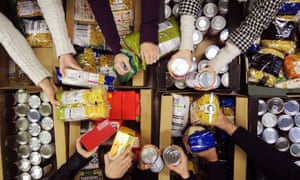
Who knows how many people are going hungry? The government should
Patrick Butler
The UK government’s welfare policy is now dependent on food bank handouts. But surely it’s time to get a proper measure of the level of food insecurity
Trussell Trust food bank
The state appears now structurally dependent on food banks – to mitigate the effects of welfare cuts, low wages, insecure work and high rents. Photograph: Publicity image
Wednesday 20 April 2016 08.00 BST
Share on Pinterest Share on LinkedIn Share on Google+
Shares
88
Comments
82
Save for later
Has the UK reached “peak food bank”? Certainly the media’s appetite for stories from the charity food frontline appear to have waned. There was relatively little coverage of the Trussell Trust’s annual figures last week, at least compared to past years. Perhaps the public, once outraged, is now resigned to foodbanks, like the poor, being always with us.
The irony is that the results of Trussell’s latest annual stocktake were an outrage. A mere 2% rise in referrals to food banks may sound inconsequential, especially after the double-digit year-on-year increases of recent times. But it shows the volume of charity food given out – enough to feed more than 1.1m people – is now doggedly entrenched, even in a supposedly improving economy and healthy jobs market.
Reliance on food banks must not become the norm, says charity
Read more
Such levels of food bank use are in danger of becoming, as the Trussell Trust points out, the “new normal”. This suggests a victory for David Cameron’s “big society”, though perhaps not one he will readily claim. The state appears now structurally dependent on food banks – not just Trussell ones, but thousands of other charity outlets too – to mitigate the effects of welfare cuts, low wages, insecure work and high rents.
That, perhaps, is the story: government welfare policy can no longer stand on its own two feet, but is dependent on food bank handouts. How corrosive this reliance on charity and the “something-for-nothing” lifestyle is on ministerial character, we can only speculate.
If food bank data tells us something about the decline of the state, however, it is less good as a measure of food insecurity. As the Labour MP Frank Field points out, we know too many people go hungry – countless accounts vividly reveal the misery of people “going without,” being unsure where the next meal is coming from, or relying on cheap, processed foods – but we don’t know how many.
Advertisement
Field argues in an all-party report on hunger published last week that the shortcomings of food bank figures (in other words, Trussell Trust figures) may have blunted the public’s sensitivity to hunger, because they “no longer believe the data”. This is unfair on Trussell, which has always been clear about the limits of its data, even while offering authentic and credible insights into the causes and effects of food bank use.
But Field touches on an important point, which is that the focus on food bank data alone as a proxy for the prevalence of hunger allows the government off the hook. Indeed ministers have persistently argued that food banks provide “no robust evidence” to link the impact of policies such as welfare reform to the eating habits, diets, health and wellbeing of the poorest households.
A recent report, drawn up by a group of academics, thinktanks and charities grouped under the UK Food Poverty Alliance banner agrees: it argues that the available UK data on food insecurity, both qualitative and quantitative, “does not meet the requirement for ‘hard’ evidence that many policymakers and campaigners say is necessary to lever policy change.”
It points out that both Canada and the US routinely collect robust data on how far households can meet their basic food needs (in the US in 2014, 48m households, or 14%, were food insecure). The Canadian findings show how food insecurity links to obesity, diabetes and mental illness, as well as rising healthcare costs. The UK government, it concludes, should do the same.
The government has previously rejected calls from a cross-party group of MPs to monitor food insecurity. But it should revisit that decision. If no robust evidence exists, we should seek it out. The presence of food banks in the UK is an outrage; so too is the existence of food insecurity.